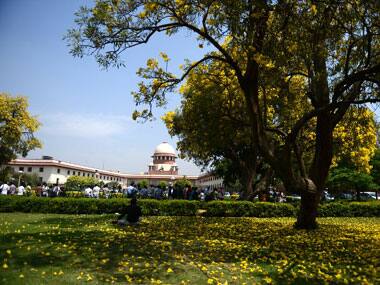New Delhi: The Supreme Court on Monday made it clear that it would first decide on the issue of referring the challenge to the new system of appointment of judges to a larger bench of nine or eleven judges and then go into the merits of the case. It also said it would pass an order appointment of additional judges of High Court, whose tenure was ending, because the National Judicial Appointments Commission was not in place yet. [caption id=“attachment_2238864” align=“alignleft” width=“380”]  Supreme Court of India.[/caption] “We all have tentatively agreed on this that we will first decide the issue of reference (to a larger bench) and then take a call on the entire matter,” a five judge Constitution Bench headed by Justice J S Khehar said. “If it is referred to a larger bench then the matter has to be heard from beginning by a new bench,” the bench, also comprising Justices J Chelameswar, M B Lokur, Kurian Joseph and Adarsh Kumar Goel, said. Senior advocates Fali S Nariman and Ram Jethmalani, who are arguing against the National Judicial Appointment Commission (NJAC) Act, said the issue of referring the matter to a larger bench is an exercise in futile as it is a delaying tactics by the Centre. Nariman, who had a heated exchange of words with Attorney General Mukul Rohatgi, demanded a stay on the operation of the NJAC. However, the bench pacified him saying “nothing is happening in the NJAC and still the issue of eminent members in the panel has not been taken up. “Since nothing is happening, we are going to pass an order (on the issue of appointment of existing additional judges for high courts whose tenure are coming to end in immediate future”. The government assured the bench that Additional Judges will not be made to suffer. “We will take care of it,” Rohatgi said, adding that the court may either record his statement or may pass an order by considering the views o the Centre. Nariman, appearing for Supreme Court Advocates-on-Record Association (SCAORA) which has challenged the NJAC Act, said that there cannot be a situation where both the NJAC and the collegium are “working together”. The bench also asked the Centre to consider the views of Chief Justices of High Courts in appointment of existing additional judges. “We are not asking you (Centre) to do it. You consider this,” the bench said adding that “the view of the Chief Justice of respective high courts have to be taken whether the existing additional judges are fit for the appointment”. During hearings, the bench has been querying as to whether it can concentrate on the issue of the Constitutional validity of the National Judicial Appointments Commission Act, 2014. Rohatgi, in his rejoinder submission, said, “I dare say this that it is a case of extreme importance”. This ground alone can be used to refer it to a bench of “sufficient strength”, he said. He further submitted that the bench cannot say that it will decide the issue of validity of the NJAC before going the “whole hog”. The bench, which heard Nariman, Ram Jethmalani and Rohatgi during the day, will resume hearing on Tuesday when the Attorney General would conclude his rejoinder submission on the issue of reference of the case to a larger bench. At the outset, Nariman referred to a book and reiterated his submissions that there was nothing left to be referred to a larger bench and the present five-judge bench can decide the plea. “It would be an exercise in futility to refer it to a bench of nine or eleven. As the Article 124 has already been substituted,” he said. “We are looking at the new law whether it does away with independence of judiciary,” the bench said. Jethmalani also echoed the views of Nariman on the issue of reference of the matter to a larger bench and referred to case laws to cite circumstances under which cases can be sent to bigger benches. A matter can be sent to larger bench when the court is of the view that there “is or are error/s apparent” in the judgement and the matter is of “public importance”, he said. At the fag end of the day, there was an exchange of words between Nariman and Rohatgi on the issue of reference of the matter to a larger bench. If the larger bench agrees with the 1993 verdict, that had led to collegium system, then the Centre may say that the then existing law has now undergone the change, Nariman said. Rohatgi submitted that the question involved is of great “importance” and said, “suppose, the court strikes down the NJAC, then what will happen. The question is that can the old system, which is dead, be revived?”. He also referred to two US judgements to drive home the point that legal positions change with the change in circumstances and said that in 1980, the US court had upheld criminalising gay sex. Almost 13 years later, the US court revisited its position on gay sex, he said. Rohatgi referred to one of the prayers of the SCAORA and said that it has sought revival of collegium system and hence, the matter be referred to a larger bench. Earlier, the SCAORA had alleged that the Centre has “held up” the court for “no purpose” by seeking hearing by a larger bench. PTI
The Supreme Court on Monday made it clear that it would first decide on the issue of referring the challenge to the new system of appointment of judges to a larger bench of nine or eleven judges and then go into the merits of the case.
Advertisement
End of Article
Written by FP Archives
see more


)

)
)
)
)
)
)
)
)



